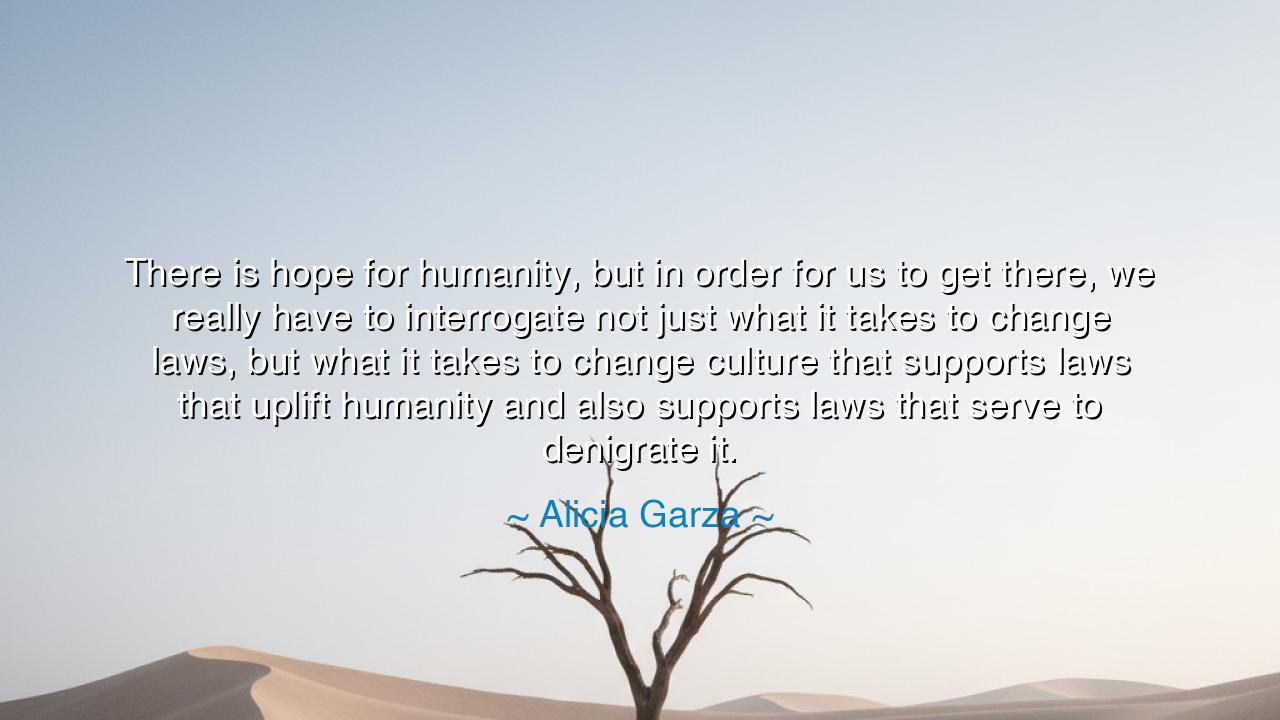
There is hope for humanity, but in order for us to get there, we
There is hope for humanity, but in order for us to get there, we really have to interrogate not just what it takes to change laws, but what it takes to change culture that supports laws that uplift humanity and also supports laws that serve to denigrate it.






"There is hope for humanity, but in order for us to get there, we really have to interrogate not just what it takes to change laws, but what it takes to change culture that supports laws that uplift humanity and also supports laws that serve to denigrate it." Thus spoke Alicia Garza, the voice of courage and conscience in an age trembling between awakening and collapse. Her words do not simply call for reform—they call for transformation. For Garza, co-founder of the Black Lives Matter movement, understood a truth as old as civilization itself: that laws are but the reflection of a people’s soul. To change what is written in the code of nations, we must first change what is engraved upon the hearts of men and women.
In this declaration, Garza reveals the deeper battle that defines every age—the struggle not between rulers and the ruled, but between conscience and custom, between the morality that uplifts and the prejudice that corrupts. Laws can be repealed and rewritten, but unless the culture that birthed them is transformed, injustice merely wears a new disguise. Her words are not those of despair, but of sober hope: the belief that humanity can yet rise, but only if it dares to question not only the hand that governs, but the mind and spirit that obey.
Consider the wisdom hidden in her command to “interrogate culture.” To interrogate is not to destroy—it is to illuminate. It is to ask of our traditions, “Do you serve life, or do you enslave it?” For culture, though it may nurture the heart, can also bind it in chains of habit and fear. The ancients knew this well. In Athens, Socrates drank the poison hemlock not because he broke the law, but because he questioned the beliefs that upheld it. He dared to ask his city why it punished those who thought freely, and in so doing, he revealed that true justice cannot exist without self-examination. Garza’s call is the same: a demand that we, too, become philosophers of our own age, questioning the unspoken values that shape our world.
The history of humankind is a testament to her insight. The Civil Rights Movement of the twentieth century did not merely seek the end of segregation; it sought the rebirth of conscience. When Rosa Parks refused to surrender her seat, her act changed no law that day—but it transformed a culture that had forgotten compassion. When Martin Luther King Jr. marched in peace, his power did not lie in legislation, but in his appeal to the human soul—to awaken love where hate had rooted deep. From these movements, we learn what Garza means: that culture must evolve before law can endure, for the heart of a nation beats before its statutes are written.
And yet, Garza also speaks to the paradox of hope itself. She reminds us that there is hope for humanity—not as a passive comfort, but as a call to action. Hope is not a resting place; it is a summons. It is the courage to confront the darkness within one’s own community, one’s own mind. To hope, in her view, is to labor—to participate in the sacred work of renewal. It is to believe that the world can be better, but only through the fierce honesty of reflection and reform. Hope without interrogation becomes illusion; interrogation without hope becomes despair. Only when the two walk hand in hand can justice be born anew.
Her words echo like prophecy across time, for every age faces its own blindness. In Rome, emperors passed decrees of peace while their soldiers ravaged the world. In our own time, nations proclaim equality even as inequality festers beneath. Garza warns that laws which uplift humanity cannot stand so long as the culture beneath them worships division, greed, or fear. The law may declare all people free, but if hearts remain chained by prejudice, the freedom is a lie. The true revolution, she teaches, begins not in the courts, but in the collective spirit—in the stories we tell, the heroes we honor, and the humanity we choose to see in one another.
Therefore, my listener, take this wisdom into your heart. Do not be content with changing systems—change souls. Question not only what your leaders decree, but what your customs celebrate. Ask yourself: do my words, my actions, my silences serve life or diminish it? For each of us is a lawmaker, whether or not we sit in a hall of power. Every act of kindness, every defense of truth, every challenge to cruelty rewrites the invisible code of the world. To heal the culture is to heal the laws, and to heal the laws is to heal humanity itself.
And so, as Alicia Garza declares, let hope be your torch—but let truth be your guide. Do not fear to interrogate, for questioning is the first act of freedom. Build a culture that honors dignity, not domination; that uplifts rather than oppresses. For only when we change what we cherish will the laws of men reflect the laws of heaven. In that transformation lies the promise of her words—and the hope for humanity that still glimmers, awaiting those brave enough to kindle it into flame.






AAdministratorAdministrator
Welcome, honored guests. Please leave a comment, we will respond soon